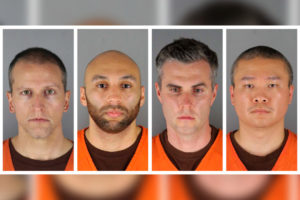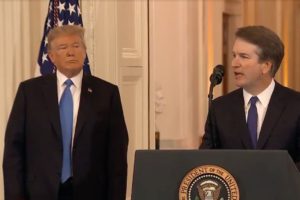On February 16, 2018, Special Counsel Robert Mueller obtained a federal indictment of 13 Russian nationals and 3 Russian companies for conspiring to wage “information warfare” by “impairing, obstructing, and defeating the lawful functions of the United States by dishonest means in order to enable Defendants to interfere with U.S. political processes, including the 2016 presidential election.”
According to the indictment, in 2014 the defendants, posing as U.S. persons, contacted American political and social activists on social media sites. Using information derived from these contacts, they structured disinformation operations to be used in the upcoming presidential election.
Once the presidential campaign started, they used stolen Social Security numbers and birth dates of real U.S. persons to set up bank and PayPal accounts. Through these, the defendants funded their “operations primarily intended to communicate derogatory information about Hillary Clinton, to denigrate other candidates such as Ted Cruz and Marco Rubio, and to support Bernie Sanders and then-candidate Donald Trump.”
Quoting from the defendants’ communications, the indictment avers that they set up social media accounts to spread content that focused on “politics in the USA” and to “use any opportunity to criticize Hillary and the rest (except [Bernie] Sanders and Trump – we support them).” The indictment outlines a number of online media postings and other efforts that attacked Clinton and encouraged support for Sanders, Green Party candidate Jill Stein, and Trump.
Also while posing as U.S. persons, the indictment says they contacted Trump campaign operatives to provide support. The indictment makes clear that the Trump organizers were unaware of the Russians’ true identities and motives.
Not until page 23 of the 37-page indictment does the defendants’ true purpose come into focus. As stated there, after the election, they organized and promoted rallies “in support of president-elect Trump, while simultaneously using other false U.S. persons to organize and coordinate rallies protesting the results of the 2016 presidential election.”
For example, on November 12, 2016, the defendants and their unnamed co-conspirators organized a rally in New York designed to “show your support for President-Elect Donald Trump” while on the same date they organized a rally in New York called “Trump is NOT my President.” Three days later, they organized a North Carolina rally entitled “Charlotte Against Trump.”
In addition to undercutting the Trump-Russia collusion narrative, these anti-Trump measures make apparent that, rather than achieve any particular electoral outcome, the defendants intended to sow dissension, bitterness, and distrust among the American electorate. They were trying to do in America what Russia has done in other countries by mounting disinformation campaigns to undermine trust and confidence in democratic institutions.
In announcing the indictment, Deputy Attorney General Rod Rosenstein emphasized that it neither alleges that any American knowingly acted in concert with the defendants nor that the defendants’ efforts changed the outcome of the election. While all of that is undoubtedly true, it must be recognized that the defendants had to have known that their efforts described in the indictment would not have any material effect on the election results. Like everyone else, they could read the polls. Hillary was going to win, and Trump was guaranteed to lose. That solid and inescapable political consensus limited what they could hope to accomplish.
So causing one candidate to win and another to lose was not their goal. Instead their mission was to weaken and erode Americans’ confidence in our democratic institutions and to poison and sabotage the acceptance of the election outcome by millions of Americans who supported the losing candidate. In short, they wanted to cause turmoil, dissension, and disorder and to cripple our government. Given the post-election chaos, division and bitterness, they certainly seem to have achieved their purpose.
The indictment was heralded by the media as a major achievement by Team Mueller. But a few observers questioned whether Mueller truly expected any of the defendants to appear in a U.S. court to answer the charges. Others asked if the indictment was merely an empty public relations move by Mueller attempting to show that his investigation was producing solid results.
The answers to these questions have started to emerge. Against all expectations, in April, lawyers for one of the Russian corporate defendants, Concord Management and Consulting, LLC, entered their appearances in the U.S. District Court for the District of Columbia. They followed up by serving extensive discovery requests on Team Mueller seeking full disclosure of the government’s case and investigation including sensitive national security and intelligence information.
This type of discovery is called “graymail” (as distinguished from blackmail) in which the government is faced with having to disclose closely guarded state secrets in order to proceed with the prosecution. The alternative is to drop the charges.
Given that the maximum penalty against Concord is an uncollectable $500,000 fine or equally uncollectable compensation to anyone damaged by the alleged conspiracy, the choice is all the more bitter for Team Mueller. Should they litigate the discovery requests? If they lose and are faced with having to disclose sensitive intelligence information about the case and their investigation should they withdraw the indictment against Concord? And, if they drop the charges, are they prepared for the resulting public mockery and howls of derision?
On Friday May 5, 2018, Team Mueller immediately began backtracking by filing a motion asking U.S. District Judge Dabney Friedrich to postpone Concord’s arraignment set for May 9, 2018.
They claimed that it was unclear whether Concord had formally accepted the court summons related to the case. In their motion, they included Concord’s discovery requests.
“Until the Court has an opportunity to determine if Concord was properly served, it would be inadvisable to conduct an initial appearance and arraignment at which important rights will be communicated and a plea entertained,” wrote the prosecutors. “That is especially true in the context of this case, which involves a foreign corporate defendant, controlled by another, individual foreign defendant, that has already demanded production of sensitive intelligence gathering, national security, and foreign affairs information.” [Emphasis added]
Team Mueller proposed that the arraignment be postponed while the parties briefed the issue of whether the court summons has been properly served on Concord.
The next morning, Concord’s lawyers replied, “Defendant voluntarily appeared through counsel as provided for in [the federal rules], and further intends to enter a plea of not guilty. Defendant has not sought a limited appearance nor has it moved to quash the summons. As such, the briefing sought by the Special Counsel’s motion is pettifoggery.” [Emphasis added]
Defense counsel argued that Team Mueller was trying “to usurp the scheduling authority of the Court” by waiting until Friday afternoon to try to delay a proceeding scheduled for the following Wednesday. They also stated that the special counsel’s office has not replied to Concord’s discovery requests and, ratcheting up the pressure on the Muellerites, stated that their client intends to assert its speedy trial rights.
Judge Friedrich, a Trump appointee, denied Team Mueller’s request and ruled that the arraignment would proceed as scheduled on May 9.
So what happened at the arraignment? Did things get better for Team Mueller? Hardly.
At the arraignment, Concord’s lead counsel, Eric Dubelier, was asked whether he represents Concord Catering, another one of the charged Russian companies. He replied that he did not and added, “I think we’re dealing with the government having indicted the proverbial ham sandwich. That company didn’t exist as a legal entity during the time period alleged by the government.” [Emphasis added]
Then, hinting at more of the graymail yet to come, he remarked darkly that, “We now know that the special counsel apparently has access to [Concord’s] confidential filings at the Office of Foreign Assets Control, which in and of itself is a disturbing fact.”
Dubelier stated, “Your Honor, we waive formal reading of the indictment. We enter a plea of not guilty. We exercise our right to a speedy trial.” [Emphasis added]
So, what does all of this mean? Metaphorically speaking, it would appear that the yapping dog chasing the car has sunk its teeth into the spinning tire. There is no way for Rover to escape injury. Even if Mueller and his pit bulls win the discovery battle and the case at trial, what’s the prize? A $500,000 fine or compensation to victims? How will they collect?
This is a no lose situation for Concord and a self-inflicted wound for Mueller. And, as the saying goes, self-inflicted wounds are always the most painful.
More importantly, this unforced prosecutorial error is a victory for 63,000,000 Americans who voted for Donald Trump and strongly oppose having the outcome of the election undone by Mueller’s politically motivated and rigged investigation. It will be a pleasure to see Team Mueller dragged kicking and squealing into an American courtroom where for it the process will be the punishment.
George Parry is a former federal and state prosecutor who practices law in Philadelphia. He blogs at knowledgeisgood.net and may be reached at kignet1@gmail.com.




Leave a Reply
Leave a reply.